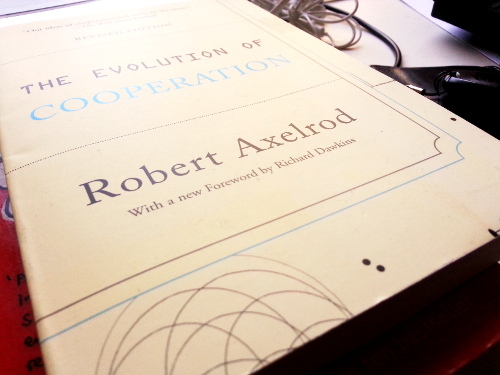Cooperation¶

I need to drop this here as well. After more than a year I’ve finally managed to finish this book by Robert Axelrod. It’s just 200 pages thick thin, but it took a while. Especially in the middle I got somewhere lost.
Too much data, to much theoretical stuff. Half of a year later things have changed. Suddenly I was ready for it.
And hell, what a dose of data I should get. The evolution of cooperation tries to answer the question where and why cooperation emerges in world of egoists, self-focused individuals and what are the parameters that influence the development and have most likely an impact.
One of the key questions is The prisoners dilemma out of the Game Theory.
Two members of a criminal gang are arrested and imprisoned. Each prisoner is in solitary confinement with no means of speaking to or exchanging messages with the other. The police admit they don’t have enough evidence to convict the pair on the principal charge. They plan to sentence both to a year in prison on a lesser charge. Simultaneously, the police offer each prisoner a Faustian bargain. Here’s how it goes:
If A and B both confess the crime, each of them serves 2 years in prison
If A confesses but B denies the crime, A will be set free whereas B will serve 3 years in prison (and vice versa)
If A and B both deny the crime, both of them will only serve 1 year in prison
Because betraying your partner (by confessing) always rewards more than cooperating with them, all purely rational self-interested prisoners would betray the other, and so the only possible outcome for two purely rational prisoners is for them both to betray each other. The interesting part of this result is that pursuing individual reward logically leads the prisoners to both betray, but they would get a better reward if they both cooperated. In reality, humans display a systematic bias towards cooperative behavior in this and similar games, much more so than predicted by simple models of “rational” self-interested action.
This sums it up, I think. But around this very simple and basic situation there are several possible outcomes in the real world. And the study Robert Axelrod performed around it, took the whole Dilemma to a new level: He performed an iterated version of it, with several rounds, multiple contestants and two runs.
In the first run only a couple of contestants (in form of small programs) were sent in by authors homed within the Game Theory. The results were published.
On program performed quite well, though it was very simple. The results were sent back to the competitors of the first round and a second round was announced. This time even more programs came in to join the competition. All of them could (and some probably have) been optimized using the results from the first run.
But again the very same program that already outperformed everybody in the first run, performed that well, that it also can be announced the winner of the second run.
This isn’t new (the book is from the 80’s by the way). Bu the rest of the book covers the topic why this simple rule were so successful, even twice. What where the circumstances of its success and what would have been necessary to change in order to let if fail.